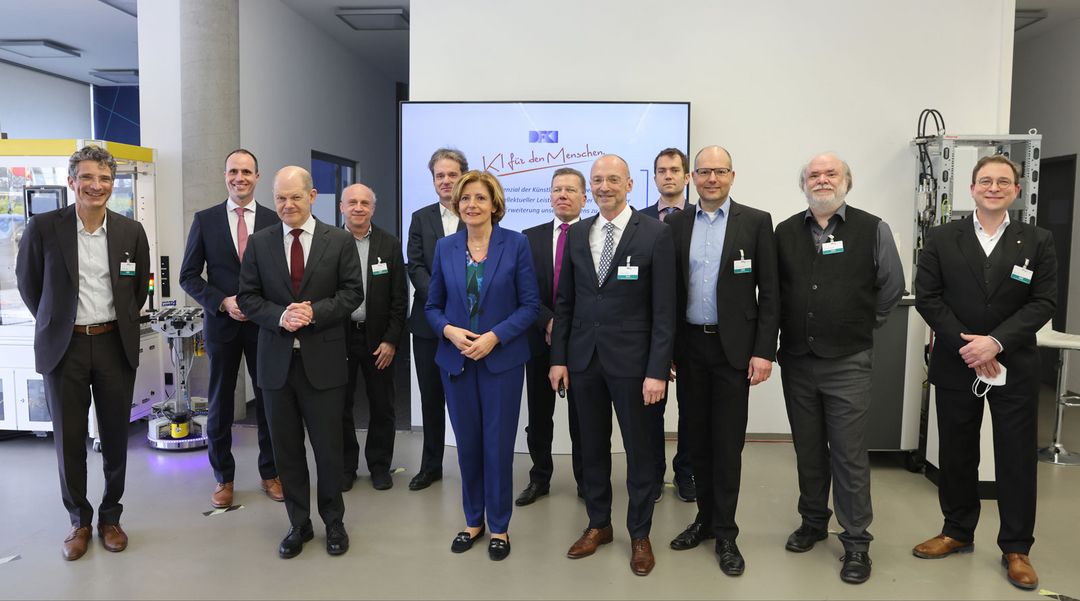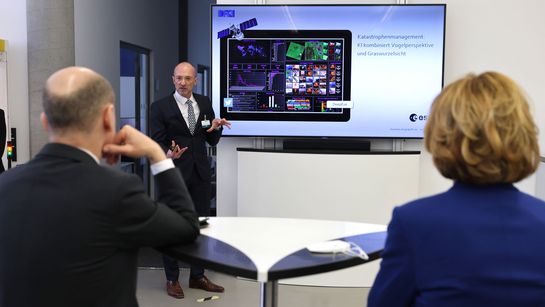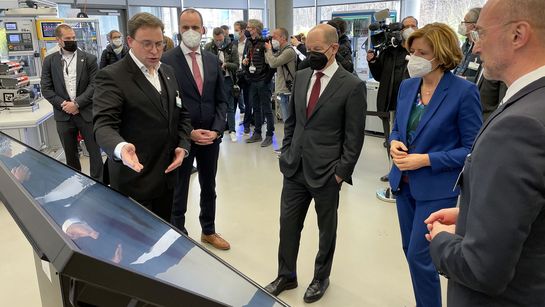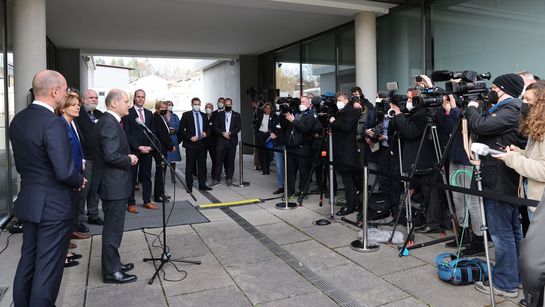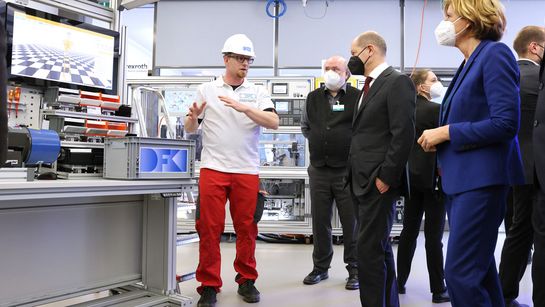“I am very grateful to be here and very impressed,” said German Chancellor Olaf Scholz after his visit to the German Research Center for Artificial Intelligence (DFKI) in Kaiserslautern. He added that it was “important to know that Germany is one of the countries at the forefront” when it comes to scientific penetration and technological expertise in AI. Accompanied by Minister President Malu Dreyer and Science Minister Clemens Hoch, he was given insights into selected projects and examples from the transfer activities by DFKI CEO Prof. Antonio Krüger and Executive Director of the Kaiserslautern site Prof. Andreas Dengel in the innovation-rich premises of SmartFactory-KL. He emphasized DFKI's transfer performance with reference to the many spin-off startups and numerous industrial partners that make use of DFKI's expertise. Summing up, he remarked, “An impressive visit and a great opportunity for insights and for a bit of pride because it's here in our country.”
Minister President Malu Dreyer commented, “A central political issue of our time is digitization and the associated modernization, both of the state, the economy and social life. DFKI in Rhineland-Palatinate has been the leading business-related research institution in the field of artificial intelligence for more than 30 years. We have a strong AI cluster in and around Kaiserslautern and an ambitious AI strategy for Rhineland-Palatinate. Of course, we are particularly proud that here from Rhineland-Palatinate we can also provide decisive impetus for the implementation of the federal government's AI strategy and that the DFKI, both in the transfer of research results into industrial practice and in the qualification of scientists, has a central role to play.”
Clemens Hoch, Minister of Science of Rhineland-Palatinate, added: “By supporting the foundation of DFKI in Kaiserslautern some 30 years ago, the state recognized the future importance of artificial intelligence at a very early stage. It can enable many great improvements to our science, our economy and our society and make valuable contributions to solving our major societal challenges; for example, in climate and environmental protection, in combating pandemics or with contributions to the development of new forms of diagnosis and therapy to combat serious diseases such as cancer.”
Prof. Dr. Antonio Krüger, Chairman of the DFKI Executive Board, said, “The Chancellor's visit is a clear sign that the further development of AI in Germany continues to be a central concern of the government - even though crises have recently overshadowed the topic. Part of our mission is to place reliable and trustworthy AI from Germany and Europe at the forefront of international competition. We are pleased that we were able to demonstrate today at the highest level how we are tackling this challenge in cooperation with the federal government, the states, our shareholders and industry partners, and how we intend to continue to ambitiously shape this path.”
Prof. Dr. Andreas Dengel, Executive Director of DFKI in Kaiserslautern and AI Ambassador of the state of Rhineland-Palatinate: “The sustainable transfer of research results is the basis for the integration of beneficial technologies into society. Successful transfer is not a one-way street, but thrives on close cooperation and a vital ecosystem of research and application. Today, we were able to use selected practical examples to show how artificial intelligence can also be used to improve people's cognitive work and how AI can help to better master major societal challenges such as a pandemic and climate change. The visit of the Chancellor, the Prime Minister and the Minister underlines the relevance of AI research. We consider it a great appreciation of the research and transfer achievements of our employees, not only at the Kaiserslautern site, but throughout DFKI.”
Third Mission: The Transfer Ecosystem of the DFKI
One focus was on DFKI's transfer ecosystem, which was presented using selected technology developments from the TransferLabs located in Kaiserslautern:
To enable partners outside of funded consortium projects to continuously and actively participate in current developments in artificial intelligence, special TransferLabs offer individual participation options for any company size. The Transferlabs follow an established model of success for the direct transfer of research results to industry: the customer's profile and wishes are incorporated into the targeted development of innovative solutions from the broad field of AI research.
Within the AI4EO Solution Factory, DFKI uses AI expertise together with Earth observation data from ESA to develop new solutions and business models. The largest current project is the Yield Consortium Transferlab. It pursues the goal of using AI to better estimate the growth status and growth development for all important arable crops in order to be able to use them for yield prediction and risk models.
The Transferlab SAIL with Sartorius is about the use and development of AI tools for biopharmaceutical products. We are researching deep learning algorithms and methods for image recognition of cells and organoids, for analysis and modeling of biological systems, and for simulation and optimization of biopharmaceutical production processes.
In the police transfer lab KIforPol with BKA/LKA, possible applications of artificial intelligence from the field of homeland security are being researched and tested in an application-oriented manner. Intelligent solutions are required in particular for the analysis of data for the collection and presentation of evidence or for specific pattern recognition in mass data.
Pandemic simulation for municipalities and intelligent sensor technology for physical labor
Two selected projects were demonstrated in a practical way: First, the AScore Pandemic Cockpit, which facilitates to decide corona measures locally. An intuitive dashboard is used to evaluate data that estimates the impact of specific measures using simulation software at the local level.
BIONIC was demonstrated, an intelligent sensor network that can reduce physical stress. Through manageable, robust and data-secure mobile systems, objective real-time motion analyses are performed that immediately alert people to their incorrect postures. With the spinoff Sci-Track, this promising technology has also recently found its way from research to the market.

